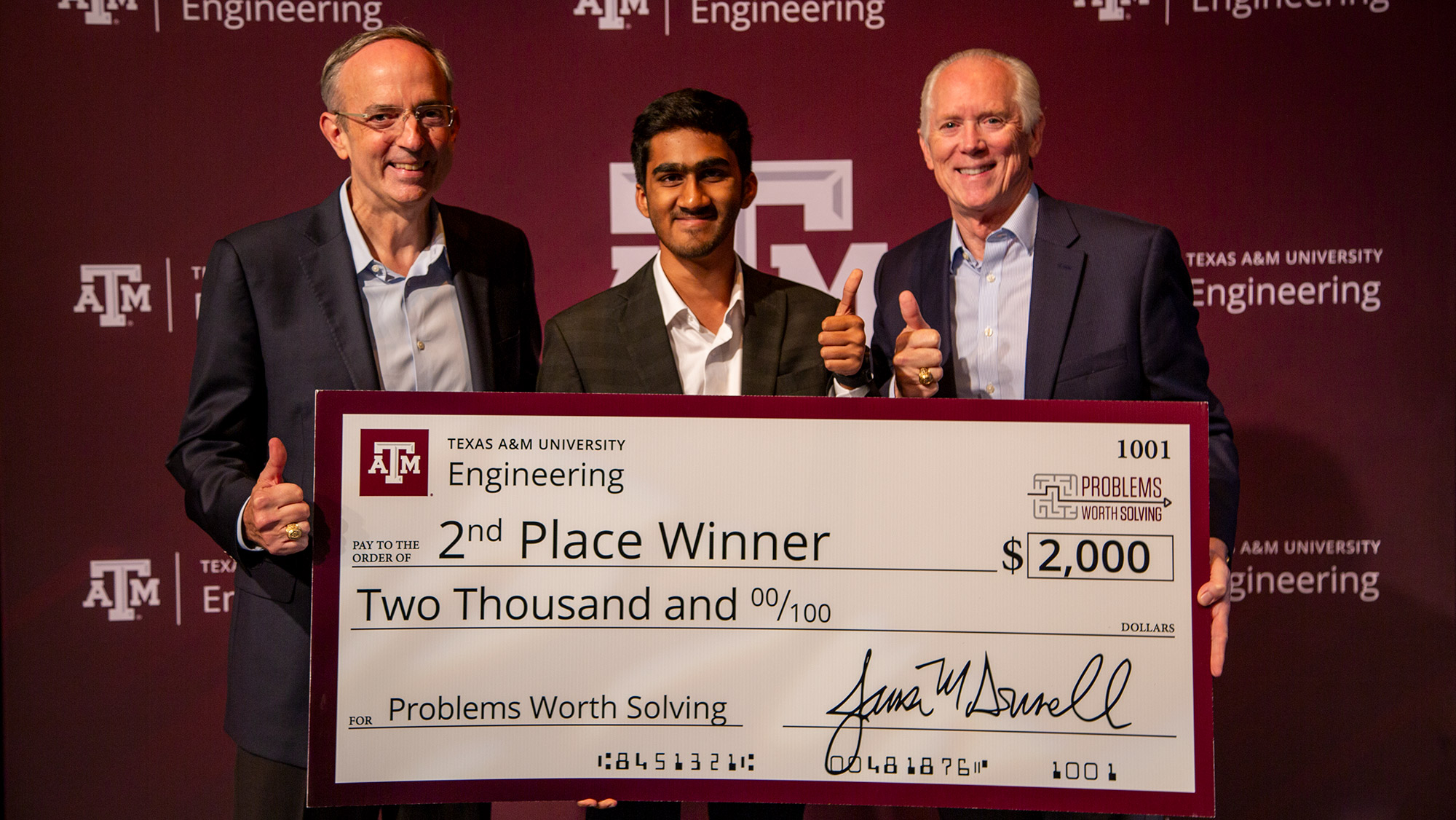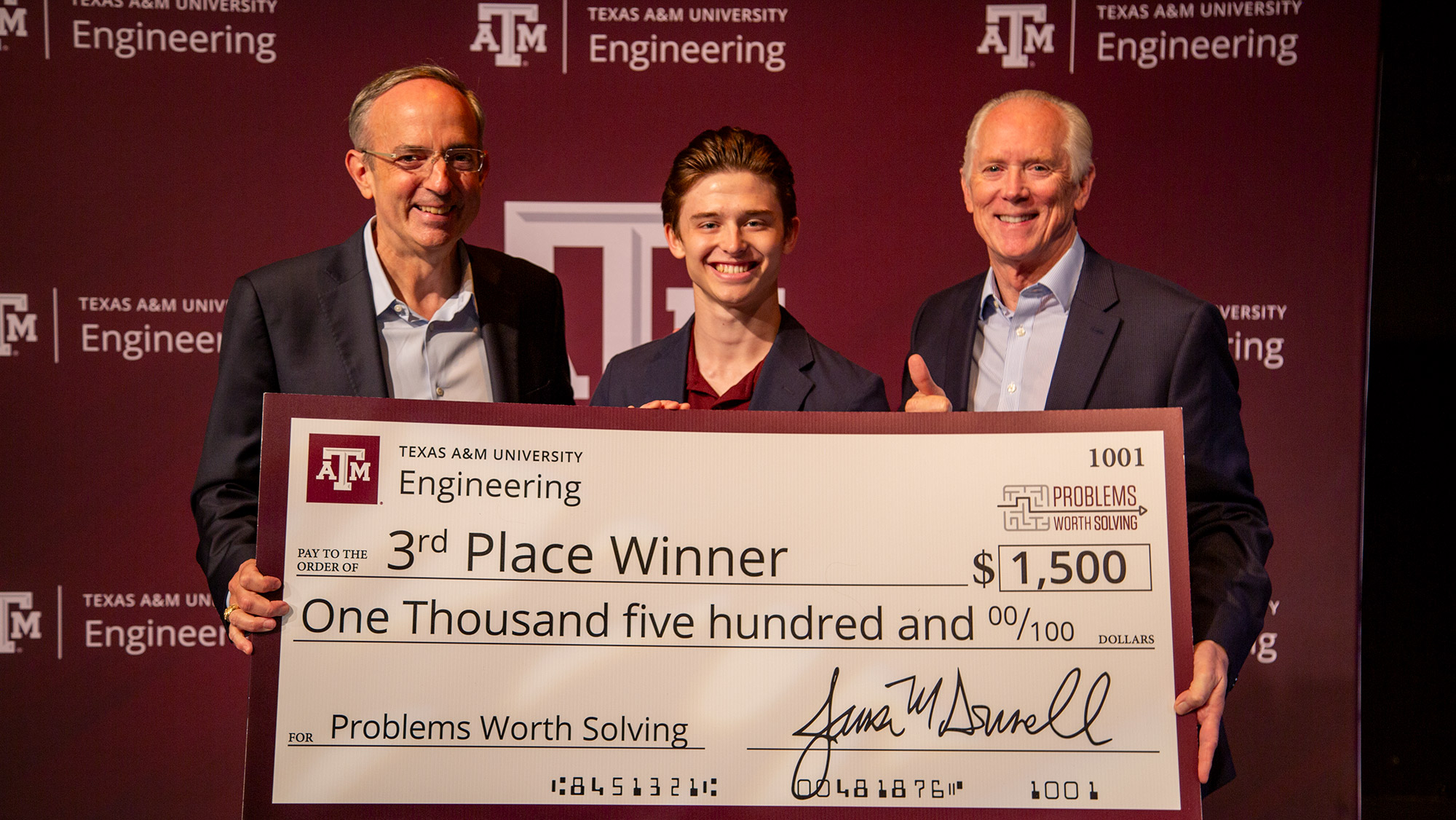The College of Engineering’s Meloy Engineering Innovation and Entrepreneurship Program hosted the third annual Problems Worth Solving, a pitch competition that invites Aggies from all majors to identify critical problems that could potentially serve as the basis for new startups or investments.
The Problems Worth Solving Competition challenges students to highlight the significance of a problem rather than propose a solution. This unique format emphasizes a critical element of entrepreneurship: the user experience.
Participants must submit an application that includes short answers and a 60-second video pitching their problem. The top five finalists are invited to present five-minute live problem pitch in front of judges and a student audience. Before the final presentations, all finalists receive coaching from Meloy Program faculty members to help perfect their pitches.
This year’s participants focused on identifying urgent, high-impact problems where funding and ingenuity could make a difference in people’s lives on small and large scales.

Molecular and cell biology student Chaitanya Dandekar won first place and $2,500 for his pitch about hypercapnia, a dangerous buildup of carbon dioxide in the blood that occurs in advanced stages of Chronic Obstructive Pulmonary Disease (COPD). Early symptoms of hypercapnia are often missed, and current diagnostic tools are costly, painful and ineffective. Without proper monitoring tools, physicians risk misdiagnosing or mistreating symptoms, which can lead to hospitalization and even death.
“The overall experience from submitting my idea, to meeting with the other finalists, working with Meloy faculty like Chris Westfall to improve my pitch, and finally presenting was challenging yet rewarding,” Dandekar said. “While it was difficult to refine my pitch within the short time given, I was able to learn a variety of skills that I will take with me and use in my future endeavors.”
Along with the first-place title, Dandekar earned the distinction of being a guest sponsor for a 2025-26 Aggies Invent, which will focus on solving the winning problem he pitched. He will present the problem statements, offer guidance throughout the event and serve as a judge.

Computer engineering student Sreevikram Rajaraman earned second place and $2,000 for pitching the threat AI datacenters pose to water supplies. As AI and cloud computing rapidly expand, the massive data centers powering them consume enormous amounts of water. This creates a critical conflict that forces communities across the country into an impossible choice between economic development and protecting their finite, life-sustaining water supplies.
“I believe the Problems Worth Solving competition provides students with a low to medium stakes environment to practice and hone their pitching skills,” Rajaraman said. “I see this as the next step in difficulty from class presentations. Preparing and pitching in this event really helped me learn as a public speaker.”

Mechanical engineering student Cooper Lucas won third place and $1,500 for presenting a similar problem: Ai is fueling an explosion of new data centers, and America’s power grid is struggling to keep up. While other countries are proactively expanding infrastructure ahead of demand, the U.S. often waits until systems fail before upgrading. If this trend continues, it could lead to higher costs, more outages, and loss of competitive edge in AI.
“Problems Worth Solving sets itself apart from other competitions by focusing exclusively on the problem, which means that the barrier to entry is much lower than in other pitch competitions,” Lucas explained. “This makes it extremely accessible to a wider audience. Even well-thought-out applications can take less than an hour, so there are no downsides to applying.”
Aerospace engineering masters’ student Akku Kumar earned fourth place for his pitch surrounding airplane baggage delays. Currently, airlines lack data on the sizes and number of bags coming on board airplanes, which can lead to potential delays, frustrated passengers and increased costs.
Computer engineering student Sean Hau Goh finished fifth for his pitch on the risk quantum computers pose to traditional data encryption methods. Because quantum computers can solve common encryptions in minutes, all current data protections may be breakable soon. As such, the time for quantum proof encryption methods is now.
“The Meloy professors taught us how to bring ideas to life through storytelling,” Goh said. “The competition sparked our creativity and helped us unlock our potential, giving us the courage to stand on stage and talk about complex topics in a way that connected with an audience.”
Rounding out the winners, management information systems student Corbin Fanning was awarded an honorable mention and $250.